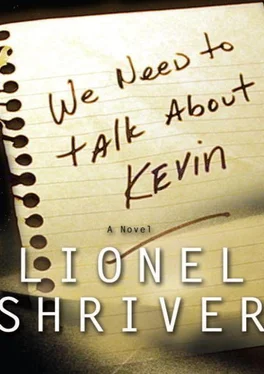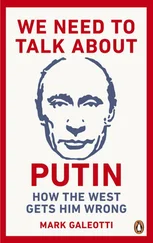At one point she crossed to the candy machine in the corner. The exact-change light must have been on, because she returned and asked if I had change of a dollar. I fell over myself checking every coat pocket, every cranny of my purse, so that by the time I scrounged the coins together she may have wished she’d never asked. I contend with strangers so infrequently now—I still prefer booking flights in the back room at Travel R Us—that during small transactions I panic. Maybe I was desperate to have a positive effect on someone else’s life, if only by providing the means to a Mars Bar. At least this awkward exchange broke the ice, and, to pay me back for what I made seem so much trouble, she spoke when she resumed her seat.
“I ought to bring him fruit, I guess.” She glanced apologetically at the M&M’s in her lap. “But Lord, you know he’d never eat it.”
We shared a sympathetic look, mutually marveling that kids who commit grown-up crimes still have their little-boy sweet tooth.
“My son claims Claverack food is ‘hog slop,’” I volunteered.
“Oh, my Marlon do nothing but complain, too. Say it ain’t ‘fit for human consumption.’ And you hear they bake saltpeter in the bread rolls?” (This rusty summer-camp rumor is surely sourced in adolescent vanity: that a teenager’s lavish libidinous urges are so seditious as to demand dampening by underhanded means.)
“No, ‘hog slop’ was all I could get out of him,” I said. “But Kevin’s never been interested in food. When he was little I was afraid he would starve, until I figured out that he would eat as long as I wasn’t watching. He didn’t like to be seen needing it—as if hunger were a sign of weakness. So I’d leave a sandwich where he was sure to find it, and walk away. It was like feeding a dog. From around the corner I’d see him cram it in his mouth in two or three bites, looking around, making sure nobody saw. He caught me peeking once, and spat it out. He took the half-chewed bread and cheddar and mashed it onto the plate glass door. It stuck. I left it there for the longest time. I’m not sure why.”
My companion’s eyes, previously alert, had filmed. She had no reason to be interested in my son’s dietary proclivities and now looked as if she regretted having started a conversation. I’m sorry, Franklin—it’s just that I go for days barely speaking, and then if I do start to talk it spews in a stream, like vomit.
“At any rate,” I continued with a bit more calculation, “I’ve warned Kevin that once he’s transferred to an adult facility the food is bound to be far worse.”
The woman’s eyes narrowed. “Your boy don’t get out at eighteen? Ain’t that a shame.” Skirting the waiting room’s taboo subject, she meant: He must have done something bad.
“New York is pretty lenient with juveniles under sixteen,” I said. “But even in this state, kids have to do a five-year minimum for murder—especially when it’s seven high school students and an English teacher.” I added as her face rearranged, “Oh, and a cafeteria worker. Maybe Kevin has stronger feelings about food than I thought.”
She whispered, “ KK .”
I could hear the reels in her head rewinding, as she grasped frantically after everything I’d said to which she’d only half listened. Now she had reason to be interested in my son’s secretive appetite—and in his “musical” preference for tuneless cacophony randomly generated by computer, in the ingenious little game he used to play composing school essays entirely with three-letter words. What I had just done, it was a kind of party trick. Suddenly she was at a loss for what to say, not because I bored her, but because she was bashful. If she could scavenge a hasty bushel of bruised and mealy details from my conversational drop-fruit, she would present it to her sister over the phone the next day like a Christmas basket.
“None other,” I said. “Funny how ‘KK’ used to mean ‘ Krispy Kreme.’”
“That must be… ” She faltered. I was reminded of the time I got a free upgrade to first class, where I sat right next to Sean Connery. Tonguetied, I couldn’t think of a thing to say besides, “You’re Sean Connery,” of which presumably he was aware.
“That must be a m-mighty cross to bear,” she stammered.
“Yes,” I said. I was no longer driven to get her attention; I had it. I could control the upchuck of chatter that had embarrassed me minutes before. I experienced a seated sensation, literalized in an improbable physical comfort in my form-fitted orange chair. Any obligation to express interest in the plight of this young woman’s own son seemed to vanish. Now I was the serene party, and the one to be courted. I felt almost queenly.
“Your boy,” she scrambled. “He holding up okay?”
“Oh, Kevin loves it here.”
“How come? Marlon curse this place up one side, down the other.”
“Kevin has few interests,” I said, giving our son the benefit of the doubt that he had any. “He’s never known what to do with himself. After-school hours and weekends hung off him in big drooping folds like an oversized car coat. Bingo, his day is agreeably regimented from breakfast to lights-out. And now he lives in a world where being pissed off all day long is totally normal. I think he even feels a sense of community,” I allowed. “Maybe not with the other inmates themselves. But their prevailing humors—disgust, hostility, derision—are like old friends.”
Other visitors were clearly eavesdropping, since they flicked averted eyes at our chairs with the swift, voracious motion of a lizard’s tongue. I might have lowered my voice, but I was enjoying the audience.
“He look back on what he done, he feel any, you know—”
“Remorse?” I provided dryly. “What could he conceivably regret? Now he’s somebody , isn’t he? And he’s found himself , as they said in my day. Now he doesn’t have to worry about whether he’s a freak or a geek, a grind or a jock or a nerd. He doesn’t have to worry if he’s gay. He’s a murderer. It’s marvelously unambiguous. And best of all,” I took a breath, “he got away from me.”
“Sounds like there’s a silver lining, then.” She held herself at an inch or two greater distance than women in earnest conversation are wont, eyeing me at an angle that departed from a straight line by about thirty degrees. These subtle removals seemed almost scientific: I was a specimen. “Like, you get away from him, too.”
I gestured helplessly at the waiting room. “Not quite.”
Glancing at her Swatch, she displayed a growing awareness that in what could prove a once-in-a-lifetime opportunity, she had to work in the one question she had always wanted to ask KK ’s actual mother before it was too late. I knew what was coming: “You ever figure what it was drove him to—you ever figure out why ?”
It’s what they all want to ask—my brother, your parents, my coworkers, the documentary makers, Kevin’s psychiatric consult, the gladstone_carnage.com web-page designers, though interestingly never my own mother. After I steeled myself to accept Thelma Corbitt’s gracious invitation for coffee the week after her son’s funeral (though she never asked aloud, and she spent most of our session reading me his poems and showing me what seemed like hundreds of snapshots of Denny in school plays), it came off her in pulses, it clutched at my dress: a craving for comprehension that verged on hysteria. Like all those parents, she’d been wracked by the apprehension that the entire gory mess whose sticky pieces we would both be picking up for the rest of our lives was unnecessary . Quite. Thursday was an elective, like printmaking, or Spanish. But this incessant badgering, this pleading refrain of why, why, why —it’s so grossly unfair. Why, after all I have borne, am I held accountable for ordering their chaos? Isn’t it enough that I suffer the brunt of the facts without shouldering this unreasonable responsibility for what they mean? That young woman at Claverack meant no harm I’m sure, but her all-toofamiliar question made me bitter.
Читать дальше












